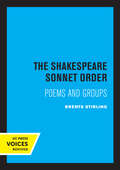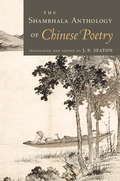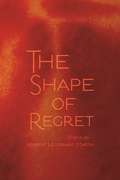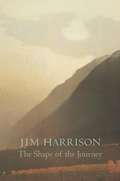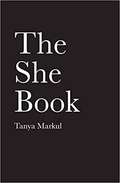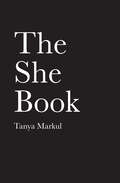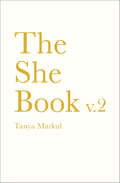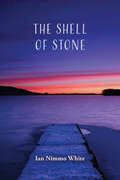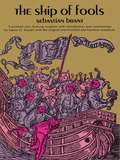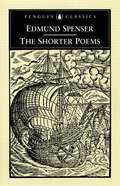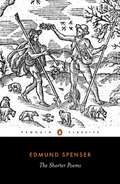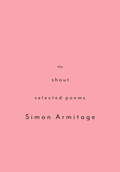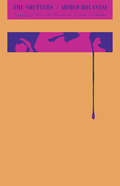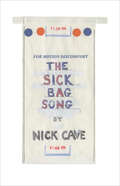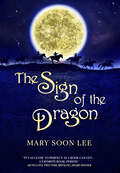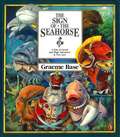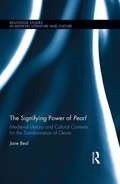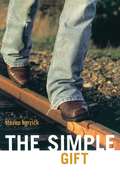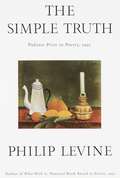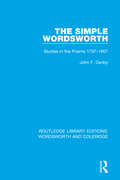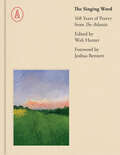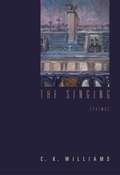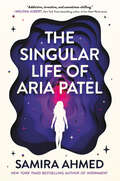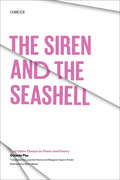- Table View
- List View
The Shakespeare Sonnet Order: Poems and Groups
by Brents StirlingThis title is part of UC Press's Voices Revived program, which commemorates University of California Press’s mission to seek out and cultivate the brightest minds and give them voice, reach, and impact. Drawing on a backlist dating to 1893, Voices Revived makes high-quality, peer-reviewed scholarship accessible once again using print-on-demand technology. This title was originally published in 1968.
The Shambhala Anthology of Chinese Poetry
by J. P. SeatonIn traditional Chinese culture, poetic artistry held a place that was unrivaled by any other single talent, and was a source of prestige and even of political power. In this rich collection, J. P. Seaton introduces the reader to the main styles of Chinese poetry and the major poets, from the classic Shih Ching to the twentieth century. Seaton has a poet's ear, and his translations here are fresh and vivid.
The Shape of Regret
by Herbert Woodward MartinThe Shape of Regret is a new poetry collection with a long shelf life, something that will be whispered about—gossiped about—by creative readers and writers for years to come. Herbert Woodward Martin is an acclaimed professor and influential American poet who has been known to inspire and encourage. To create his poems, Martin draws from his own life, experiences, and passions. Many of the poems speak directly or indirectly to poets who have shaped or interested Martin, including Hart Crane, William Carlos Williams, Lucille Clifton, Jackson Mac Low, and Robert Frost. He also gives further voice and testimony to the African American experience both in the present and the past. An early reader of the collection said that Martin "continues to contribute to the canon. As an African American poet, he incorporates voices, a range of perspectives, and a unique approach to conveying and incorporating culture into literary language." Martin has been clear that his intention with this collection is to gather as many interesting ideas as possible in one place. His aim is, and has always been, to witness a thriving poetry community—one in which poets of all backgrounds can learn from each other and continue to grow together. The Shape of Regret is a wonderful place to either start or revive one’s love of poetry.
The Shape of the Journey
by Jim HarrisonHere is the definitive collection of poetry from one of America's best-loved writers-now available in paperback. With the publication of this book, eight volumes of poetry were brought back into print, including the early nature-based lyrics of Plain Song, the explosive Outlyer & Ghazals, and the startling "correspondence" with a dead Russian poet in Letters to Yesenin. Also included is an introduction by Harrison, several previously uncollected poems, and "Geo-Bestiary," a 34-part paean to earthly passions. The Shape of the Journey confirms Jim Harrison's place among the most brilliant and essential poets writing today."Behind the words one always feels the presence of a passionate, exuberant man who is at the same time possessed of a quick, subtle intelligence and a deeply questioning attitude toward life. Harrison writes so winningly that one is simply content to be in the presence of a writer this vital, this large-spirited."--The New York Times Book Review"(An) untrammelled renegade genius... here's a poet talking to you instead of around himself, while doing absolutely brilliant and outrageous things with language."-Publishers Weekly"Readers can wander the woods of this collection for a lifetime and still be amazed at what they find."-Booklist (starred review.)When first published, this book immediately became one of Copper Canyon Press's all-time bestsellers. It was featured on Garrison Keillor's Writer's Almanac, became a finalist for the Los Angeles Times Book Prize, and was selected as one of the "Top-Ten Books of 1998" by Booklist.Jim Harrison is the author of twenty books, including Legends of the Fall and The Road Home. He has also written numerous screenplays and served as the food columnist for Esquire magazine. He lives in Michigan and Arizona.Dead DeerAmid pale green milkweed, wild clover, a rotted deer curled, shaglike, after a winter so cold the trees split open. I think she couldn't keep up with the others (they had no place to go) and her food, frozen grass and twigs,
The Shark Who Was Afraid of Everything!
by Brian JamesSharkie the shark, although frightened at everything finds his courage by helping another out of a jam. Very good for very young children.
The She Book
by Tanya MarkulThe She Book is a collection of 114 poems, prose, and quotes written for you. Because this is your year to live the life of your dreams, to heal, to witness, to be the one who queens. Once a silent star in the sky, lost, alone and unnoticed, she began to dream her life awake. Crafting together the power of words and womanhood, writer Tanya Markul has written a completely unique poetry collection fit for the phenomenal readers of today. In Tanya's words, "May we raise the bar for how we live our lives. May we ridiculously increase the amount of peace, play, creativity, beauty, love, and joy in everything we do. May we all sip from the wisdom of our suffering. And awaken with the courage to share our stories that can heal our inner and outer worlds."
The She Book
by Tanya MarkulCrafting together the power of words and womanhood, writer Tanya Markul has written a completely unique poetry collection fit for the phenomenal readers of today.In Tanya's words, "May we raise the bar for how we live our lives. May we ridiculously increase the amount of peace, play, creativity, beauty, love, and joy in everything we do. May we all sip from the wisdom of our suffering. And awaken with the courage to share our stories that can heal our inner and outer worlds."
The She Book, Volume 2
by Tanya MarkulA resilient journey through a season of loneliness, as cycle of heartache, and a year of depression–this is what she unexpectedly found within the depths of her brokenness and how she emerged stronger.This book unapologetically explores the feeling, healing, and revealing of depression and the power of asking for help and being open to receiving support from nature and others, while giving a creative and empowering voice to emotional pain.As I weptin the arms of darkness,I heard the voice of my grandmother say, Nothing stays the same, darling,not even pain.Life is a path of change.Of ecstasy and ache.So, no matter what the storm claims,let love light the way.
The Shell of Stone
by Ian Nimmo WhiteThe Shell of Stone is Ian Nimmo White’s third book-length collection of poetry. The author being a keen genealogist, many of these poems resonate with his passion for heritage, some marking major events of the twentieth century, with other poems travelling even further back to previous centuries. The author also touches on the inevitable passing of time and his own ageing, which he addresses with some mischief and fun. While there is always a presence of nostalgia, sometimes sadness, White balances this with poems about the joy of having grandchildren, observations of wildlife and the ever-increasing amount of time he is spending in his garden. The reader is left with feelings of respect for the past together with hope for the future. White’s poetry is laced with warmth and humanity, not to mention a good helping of his native Scottish humour. The experience gained in a four-decade-long career in community service has given the poet a priceless knowledge and understanding of the lives of ordinary men and women, who will be able to relate to these poems and enjoy them.
The Ship of Fools
by Sebastian BrantDefinitive English language edition of influential (1494) allegorical classic. Sweeping satire of weaknesses, vices, grotesqueries of the day. Includes 114 royalty-free illustrations.
The Shorter Poems
by Edmund Spenser Richard A. MccabeAlthough he is most famous for The Faerie Queene, this volume demonstrates that for these poems alone Spenser should still be ranked as one of England's foremost poets. Spenser's shorter poems reveal his generic and stylistic versatility, his remarkable linguistic skill and his mastery of complex metrical forms. The range of this volume allows him to emerge fully in the varied and conflicting personae he adopted, as satirist and eulogist, elegist and lover, polemicist and prophet. The volume includes The Shepeardes Calender, Complaints, and A Theatre for Wordlings.
The Shorter Poems
by Edmund Spenser Richard MccabeAlthough he is most famous for The Faerie Queene, this volume demonstrates that for these poems alone Spenser should still be ranked as one of England's foremost poets.Spenser's shorter poems reveal his generic and stylistic versatility, his remarkable linguistic skill and his mastery of complex metrical forms.The range of this volume allows him to emerge fully in the varied and conflicting personae he adopted, as satirist and eulogist, elegist and lover, polemicist and prophet.The volume includes The Shepeardes Calender, Complaints, and A Theatre for Wordlings.
The Shout
by Simon ArmitageNow in paperback, the powerful selected work of Simon Armitage, the most distinctive poetic voice of contemporary Britain.Simon Armitage is arguably the leading British poet of the past twenty years. His knowledge of the English just as they are ("a gentleman farmer / living on reduced means, a cricketer's widow, / sowing a kitchen garden with sweet peas"), his colloquial Yorkshire wit and eye for situational ironies, his ability to steal up on us with the surreal while capturing the ordinary speech of everyday life: these qualities place him at the forefront of British poetry today. This slim volume is the perfect introduction to his work for newcomers, or the ideal selection for longtime readers to keep on the bedside table.
The Shutters
by Ahmed Bouanani Emma RamadanThis surreal poetry maps Morocco’s cultural history, as Bouanani hauntingly evokes all of the violence inflicted on his country The Shutters collects the two most important poetry collections—"The Shutters" and "Photograms"—by the legendary Moroccan writer Ahmed Bouanani. By intertwining myth and tradition with the familiar objects and smells of his lived present, Bouanani reconstructs vivid images of Morocco's past. He weaves together references to the Second World War, the Spanish and French protectorates, the Rif War, dead soldiers, prisoners, and poets screaming in their tombs with mouths full of dirt. His poetry, written in an imposed language with a "strange alphabet," bravely confronts the violence of his country's history—particularly during the period of les années de plomb, the years of lead—all of which bears the brutal imprint of colonization. As Bouanani writes, "These memories retrace the seasons of a country that was quickly forgetful of its past, indifferent to its present, constantly turning its back on the future."
The Sick Bag Song
by Nick CaveThe legendary indie rock star offers a genre-bending chronicle of his 2014 American tour with the Bad Seeds that&’s part memoir, part epic poem. The Sick Bag Song began when Nick Cave was struck with inspiration during a flight between tour stops and reached for an airplane sick bag to scribble it down. This improvised diary soon grew into a restless full-length contemporary odyssey. Spurred by encounters with modern-day North America, beset by longing and exhaustion, Cave teases out the significant moments, the people, the books, and the music that have influenced him over the years.Drawing inspiration from Leonard Cohen, John Berryman, Patti Smith, Sharon Olds, folk ballads and ancient texts, The Sick Bag Song takes the form of a quest, turning over questions of creativity, loss, death, and romance. It is also the perfect companion piece to the Sundance award-winning feature documentary 20,000 Days on Earth.
The Sign of the Dragon: The Sign Of The Dragon Book 1
by Mary Soon LeeWinner of the Elgin Award!“It’s as close to perfect as a book can get… I already know this will be one of my favorites for the year. A favorite book, period.” — Beth Cato, two-time Rhysling Award winnerDrawing on Chinese and Mongolian elements, SFPA Grand Master Mary Soon Lee has penned an epic of politics, war, and the reach of dragons — perfect for fans of Game of Thrones and Beowulf.As the fourth-born prince of Meqing, Xau was never supposed to be king. But when his brothers are deemed unfit to rule and eaten by a dragon, as is the custom, Xau finds himself on the throne. The early years of his reign are marred by earthquake, flood, and war. Then a demon thought long-dead returns, leaving devastation in its wake, and Xau must broker peace with his enemies. Can their combined strength vanquish the demon before it destroys them?In the tradition of the Iliad, the Epic of Gilgamesh, and Beowulf, The Sign of the Dragon is told in poetry. Many of the individual poems appeared in award-winning magazines such as Apex Magazine, The Magazine of Fantasy & Science Fiction, and Strange Horizons. This is the revised ebook edition of the entire epic and is accompanied by forty extraordinary full-page illustrations by Gary McCluskey.Praise for The Sign of the Dragon:“What an utterly beautiful, impressive, & occasionally heartbreaking reading experience!” — Ann K. Schwader, SFPA Grand Master“This is an absolutely stunning work that I will read and reread.” — T. Frohock, author of the Los Nefilim series
The Sign of the Seahorse: A Tale of Greed and High Adventure in Two Acts
by Graeme BaseThe inhabitants of a coral reef are threatened when a shady real estate deal started by the greedy Groper floods their area with poisonous waste.
The Signifying Power of Pearl: Medieval Literary and Cultural Contexts for the Transformation of Genre
by Jane BealThis book enhances our understanding of the exquisitely beautiful, fourteenth-century, Middle English dream vision poem Pearl. Situating the study in the contexts of medieval literary criticism and contemporary genre theory, Beal argues that the poet intended Pearl to be read at four levels of meaning and in four corresponding genres: literally, an elegy; spiritually, an allegory; morally, a consolation; and anagogically, a revelation. The book addresses cruxes and scholarly debates about the poem’s genre and meaning, including key questions that have been unresolved in Pearl studies for over a century: * What is the nature of the relationship between the Dreamer and the Maiden? * What is the significance of allusions to Ovidian love stories and the use of liturgical time in the poem? * How does avian symbolism, like that of the central symbol of the pearl, develop, transform, and add meaning throughout the dream vision? * What is the nature of God portrayed in the poem, and how does the portrayal of the Maiden’s intimate relationship to God, her spiritual marriage to the Lamb, connect to the poet’s purpose in writing? Noting that the poem is open to many interpretations, Beal also considers folktale genre patterns in Pearl, including those drawn from parable, fable, and fairy-tale. The conclusion considers Pearl in the light of modern psychological theories of grieving and trauma. This book makes a compelling case for re-reading Pearl and recognizing the poem’s signifying power. Given the ongoing possibility of new interpretations, it will appeal to those who specialize in Pearl as well as scholars of Middle English, Medieval Literature, Genre Theory, and Literature and Religion.
The Simple Gift
by Steven HerrickI'm not proud. I'm sixteen, and soon to be homeless. Weary of his life with his alcoholic, abusive father, sixteen-year-old Billy packs a few belongings and hits the road, hoping for something better than what he left behind.
The Simple Truth: Poems
by Philip LevineWritten in a voice that moves between elegy and prayer, The Simple Truth contains thirty-three poems whose aim is to weave a complex tapestry of myth, history (both public and private), family, memory, and invention in a search for truths so basic and universal they often escape us all.<P><P> Winner of the Pulitzer Prize
The Simple Wordsworth: Studies in the Poems 1979-1807 (RLE: Wordsworth and Coleridge #4)
by John F. DanbyFirst published in 1960, this book studies Wordsworth’s ‘simple’ poems, such as the Lyrical Ballads, as products of a sophisticated and powerfully successful literary genius. The author aims to approach the poems as perhaps Wordsworth expected his first readers to; but as they have never been in fact. The result of this approach is to discover a Wordsworth far different to that which he has previously been presented as — the ‘Sage of Rydal’ at one extreme and a naïve perpetrator of poetical blunders at the other — and, the author argues, a far more exciting one. This book will be of interest to students of literature.
The Singing Word: 168 Years of Atlantic Poetry
by Walt HunterAn ode to America&’s people, land, and spirit, this stunning collection features a breadth of contemporary and historical poetry from the Atlantic magazine&’s 168-year archive.The poetry of The Atlantic has, from the magazine&’s first issue in 1857, called attention to the unfinished project of the nation. The magazine&’s verse has featured odes to American leaders and landscapes, laments for the dead, and calls for change, appealing to the enduring ideals of Atlantic readers. This one-of-a-kind collection selects poems of rousing optimism, clear-eyed realism, and moving lyricism—poems infused with the language of America&’s songs, myths, and history, from the Civil War up through the present in three rich parts: National Anthems, Natural Lines, and Personal Mythologies. Curated by The Atlantic&’s Poetry Editor, this anthology features both world-famous poets—from Longfellow to Limón, including Robert Frost, W. S. Merwin, Sylvia Plath, and Adrienne Rich—as well as poets whose work has never before been published outside of the magazine. Offering readers an essential understanding of American canon and the evolving nation its poets have yearned to capture—the poetry of The Atlantic is the poetry of America.
The Singing: Poems
by C. K. WilliamsNew work from the Pulitzer Prize winning author of Repair. <P><P> Reality has put itself so solidly before me there's little need for mystery. Except for us, for how we take the world to us, and make it more, more than we are, more even than itself. --from "The World" <P> In his first volume since Repair, C. K. Williams treats the characteristic subjects of a poet's maturity--the loss of friends, the love of grandchildren, the receding memories of childhood, the baffling illogic of current events--with an intensity and drive that recall not only his recent work but also his early books, published forty years ago. He gazes at a Rembrandt self-portrait, and from it fashions a self-portrait of his own. He ponders an "anatomical effigy" at the Museum of Mankind, an in so doing "dissects" our common humanity. Stoking a fire at a house in the country, he recalls a friend who was burned horribly in war, and then turns, with eloquence and authority, to contemporary life during wartime, asking "how those with power over us can effect these things, by what cynical reasoning do they pardon themselves." The Singing is a direct and resonant book: touching, searching, heartfelt, permanent.<P> The Singing is the winner of the 2003 National Book Award for Poetry.
The Singular Life of Aria Patel
by Samira AhmedFor fans of You&’ve Reached Sam and See You Yesterday, this captivating and mind-bending second-chance romance explores what it means to love—even across the multiverse.Aria Patel likes stability, certainty, predictability. It&’s why she&’s so into science. It's why she dumped her boyfriend before they went to different colleges because the odds were that something would go wrong, eventually. In a life that&’s already so chaotic, why obsess over complicated relationships and shadowy unknowns when the scientific method gives you direction and a straight path to avoid all the drama. But there&’s no avoiding anything when Aria finds herself suddenly falling through parallel universes and there&’s no formula that can save her. She can&’t explain why she&’s been waking up in a new reality almost every day, or why Rohan, and a poem from her English class, seem to be following her through every new life.As Aria desperately attempts to find a way home, she eventually ends up stuck in a parallel world very similar to her own. She cherishes this new version of her family, and she finds herself unable to deny the yearning she has for Rohan…but it&’s not her life or her Rohan. It belongs to another Aria, another girl, and unless Aria can get back home, she&’ll have taken this happiness away from someone else forever. And she may never find her own. This whirlwind novel from New York Times bestselling author Samira Ahmed will whisk you through worlds unknown, all while putting a multiverse spin on one of BookTok&’s favorite tropes: second chance romance.
The Siren and the Seashell: And Other Essays on Poets and Poetry (Texas Pan American Series)
by Octavio PazOctavio Paz has long been known for his brilliant essays as well as for his poetry. Through the essays, he has sought to confront the tensions inherent in the conflict between art and society and to achieve a unity of their polarities. The Siren and the Seashell is a collection of Paz’s essays, focusing on individual poets and on poetry in general. The first five poets he treats are Latin American: Sor Juana Inés de la Cruz, Rubén Darío, José Juan Tablada, Ramón López Velarde, and Alfonso Reyes. Then there are essays on Robert Frost, e. e. cummings, Saint-John Perse, Antonio Machado, and Jorge Guillén. Finally, there are Paz’s reflections on the poetry of solitude and communion and the literature of Latin America. Each essay is more than Paz’s impressions of one person or issue; each is the occasion for a wider discussion of cultural, historical, psychological, and philosophical themes. The essays were selected from Paz’s writing between 1942 and 1965 and provide an overview of the development of his thinking and an exploration of the ideas central in his works.
